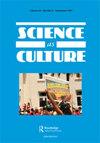Conscious, Complacent, Fearful: Agri-Food Tech’s Market-Making Public Imaginaries
IF 2.4
3区 哲学
Q1 CULTURAL STUDIES
引用次数: 10
Abstract
ABSTRACT While the tech sector has seized upon the food system as an area in which it can have a major impact, innovators within the agri-food tech domain are dogged by concerns about public acceptance of technologies that may be controversial or simply not of interest. At the same time, because they operate within an investor-dependent political economy, they must demonstrate that the public will consume the products they are creating. To both secure markets and legitimate their approaches to problem-solving, entrepreneurial innovators draw on three existing imaginaries of consumers, each of which articulates with a particular tendency they have pursued in problem-solving. Reflecting a tendency of solutionism, those promoting technologies that promise minimal processing and/or short or traceable supply chains invoke a health- and eco-conscious consumer. In keeping with technofixes, those promoting technologies of mimicry invoke a complacent consumer. Reflecting the tendency toward scientism in problem-solving and related projections of public knowledge deficits, those promoting potentially controversial technologies invoke a fearful consumer and embrace transparency to inform and assure such consumers. By promising future consumers who will willingly accept emerging technologies, each of these imaginaries seeks to resolve – for investors – potential problems of consumer acceptance generated by the particular approaches to problem-solving innovators have adopted. While STS scholars have shown how public-facing engagement exercises and policy work are often limited by deficit-driven imaginaries of the public, in these investor-facing spaces possible objections are both imagined and overcome without any interaction with actual publics.有意识的、自满的、恐惧的:农业食品科技造市的公众想象
摘要尽管科技行业已经抓住了食品系统这一可以产生重大影响的领域,但农业食品科技领域的创新者却一直担心公众是否接受可能存在争议或根本不感兴趣的技术。与此同时,由于他们在依赖投资者的政治经济中运作,他们必须证明公众会消费他们创造的产品。为了确保市场安全并使他们解决问题的方法合法化,创业创新者利用了消费者现有的三种想象,每一种想象都与他们在解决问题方面所追求的特定趋势相吻合。反映出一种解决方案主义的趋势,那些推广承诺最少加工和/或短链或可追溯供应链的技术的人唤起了健康和生态意识的消费者。为了与技术修复保持一致,那些推广模仿技术的人唤起了自满的消费者。反映出在解决问题和相关公共知识赤字预测方面的科学主义倾向,那些推广潜在争议技术的人唤起了恐惧的消费者,并接受透明度来告知和保证这些消费者。通过向愿意接受新兴技术的未来消费者承诺,这些设想中的每一个都试图为投资者解决创新者所采用的解决问题的特定方法所产生的消费者接受的潜在问题。虽然STS学者已经表明,面向公众的参与活动和政策工作往往受到公众赤字驱动的想象的限制,但在这些面向投资者的空间里,在没有与实际公众进行任何互动的情况下,可能的反对意见既被想象出来,又被克服。
本文章由计算机程序翻译,如有差异,请以英文原文为准。
求助全文
约1分钟内获得全文
求助全文
来源期刊

Science As Culture
Multiple-
CiteScore
5.20
自引率
3.80%
发文量
28
期刊介绍:
Our culture is a scientific one, defining what is natural and what is rational. Its values can be seen in what are sought out as facts and made as artefacts, what are designed as processes and products, and what are forged as weapons and filmed as wonders. In our daily experience, power is exercised through expertise, e.g. in science, technology and medicine. Science as Culture explores how all these shape the values which contend for influence over the wider society. Science mediates our cultural experience. It increasingly defines what it is to be a person, through genetics, medicine and information technology. Its values get embodied and naturalized in concepts, techniques, research priorities, gadgets and advertising. Many films, artworks and novels express popular concerns about these developments. In a society where icons of progress are drawn from science, technology and medicine, they are either celebrated or demonised. Often their progress is feared as ’unnatural’, while their critics are labelled ’irrational’. Public concerns are rebuffed by ostensibly value-neutral experts and positivist polemics. Yet the culture of science is open to study like any other culture. Cultural studies analyses the role of expertise throughout society. Many journals address the history, philosophy and social studies of science, its popularisation, and the public understanding of society.
 求助内容:
求助内容: 应助结果提醒方式:
应助结果提醒方式:


